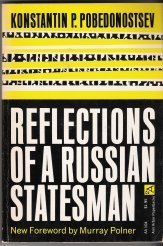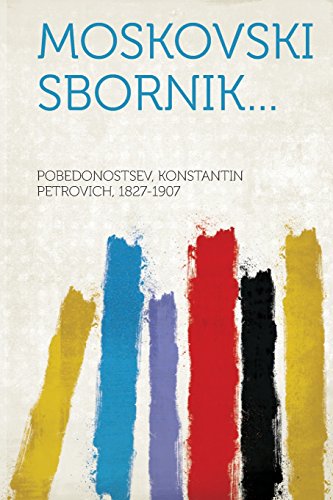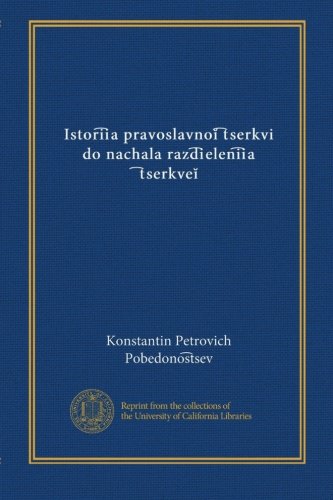Background
Konstantin Pobedonostsev was born on May 21, 1827, in Moscow.



( This work has been selected by scholars as being cultur...)
This work has been selected by scholars as being culturally important, and is part of the knowledge base of civilization as we know it. This work was reproduced from the original artifact, and remains as true to the original work as possible. Therefore, you will see the original copyright references, library stamps (as most of these works have been housed in our most important libraries around the world), and other notations in the work. This work is in the public domain in the United States of America, and possibly other nations. Within the United States, you may freely copy and distribute this work, as no entity (individual or corporate) has a copyright on the body of the work. As a reproduction of a historical artifact, this work may contain missing or blurred pages, poor pictures, errant marks, etc. Scholars believe, and we concur, that this work is important enough to be preserved, reproduced, and made generally available to the public. We appreciate your support of the preservation process, and thank you for being an important part of keeping this knowledge alive and relevant.
http://www.amazon.com/gp/product/0472061046/?tag=2022091-20

(Unlike some other reproductions of classic texts (1) We h...)
Unlike some other reproductions of classic texts (1) We have not used OCR(Optical Character Recognition), as this leads to bad quality books with introduced typos. (2) In books where there are images such as portraits, maps, sketches etc We have endeavoured to keep the quality of these images, so they represent accurately the original artefact. Although occasionally there may be certain imperfections with these old texts, we feel they deserve to be made available for future generations to enjoy.
http://www.amazon.com/gp/product/1314983407/?tag=2022091-20

(This book was digitized and reprinted from the collection...)
This book was digitized and reprinted from the collections of the University of California Libraries. It was produced from digital images created through the libraries mass digitization efforts. The digital images were cleaned and prepared for printing through automated processes. Despite the cleaning process, occasional flaws may still be present that were part of the original work itself, or introduced during digitization. This book and hundreds of thousands of others can be found online in the HathiTrust Digital Library at www.hathitrust.org.
http://www.amazon.com/gp/product/B009XUHJJI/?tag=2022091-20
Konstantin Pobedonostsev was born on May 21, 1827, in Moscow.
His father, Peter V. Pobedonostsev, a professor at the University of Moscow, educated Konstantin at home until he enrolled at the St. Petersburg School of Jurisprudence in 1841. From his father, he learned to read Old Church Slavonic, French, Latin, and German. He also studied the Bible, the writings of the Russian Orthodox Church Fathers, Greek and Roman classics, Russian history, and Russian literature. He graduated from the School of Jurisprudence with a wide knowledge of Western judicial institutions, laws, and literatures.
Pobedonostsev first won acclaim as a historian of Russian judicial institutions and as a specialist in Russian civil law. In 1846 Pobedonostsev was assigned to the eighth department of the Senate in Moscow. In 1853 he became secretary of the seventh department. In 1859 he was named lecturer in Russian civil law at Moscow University.
In 1861 Pobedonostsev was appointed tutor in Russian history and law to the heir to the throne, the future Alexander III, and was named executive secretary of the Senate. He moved to St. Petersburg into a life of great influence in the central governmental bureaucracy and the court. He employed his tutorial position to mold the views of the imperial heir. Pobedonostsev emphasized the ties between Russian Orthodoxy and Russian national history. By the late 1870s his influence on Alexander had become overwhelming.
In 1872 Pobedonostsev became a member of the State Council, a body that advised the Czar concerning projected laws. Most of the significant legislation and decrees of the 19th century received their final review and drafting in this Council. Pobedonostsev's main responsibility as a Council member was civil and ecclesiastical matters. His work in the Council contributed to his appointment in 1880 as director general of the Holy Synod of the Russian Orthodox Church. For the remainder of his life he was a member of both the Council and the Senate. His service in the highest organs of the czarist government naturally gave him power in shaping Russia's domestic policies.
Pobedonostsev's reputation in Russian history rests largely upon his accomplishments as director general of the Holy Synod. For 25 years his influence on the religious and political life of Russia was enormous as a result of his official positions and his relations with the czars, their wives, the imperial family, and the court.
In 1881 Pobedonostsev advised Alexander III concerning the selection of his ministers, most of whom were named upon his recommendation. The Czar consented to Pobedonostsev's policy of the Russification of minority groups, particularly Jews and dissenters. As director general, Pobedonostsev attempted to restrict the number and the rights of other religious groups in Russia. Under his influence Alexander III opposed any limitation of his autocratic powers, tightened censorship, tried to suppress all opposition opinion, and persecuted religious nonconformists.
Pobedonostsev also tutored the future Nicholas II and was one of his most influential advisers until the Revolution of 1905. In his writing Pobedonostsev strongly attacked Western rationalism and liberalism. He died in St. Petersburg on March 23, 1907.
In the sphere of practical politics Pobedonostsev exercised considerable influence in the Russification policy of Alexander III. This found expression in nationalist propaganda.
Pobedonostsev's Reflections of a Russian Statesman (1896; trans. 1898) constitutes a strong and earnest criticism of many of the views of liberals both in Russia and in Europe and helps to explain the reaction of the imperial government to all signs of public expression of liberal hopes.
(Unlike some other reproductions of classic texts (1) We h...)
( This work has been selected by scholars as being cultur...)
(This book was digitized and reprinted from the collection...)
Pobedonostsev did develop a social program for the Church while limiting its autonomy. He imposed repressive measures against the non-Orthodox. He carried out major Church reforms, but they resulted in a church that by 1900 was enmeshed in bureaucracy, alienated in many ways from society, resentful of secular authorities, and divided internally. Stagnation in church and state policies prevailed until Pobedonostsev retired in 1905.
Quotations:
"In a Democracy, the real rulers are the dexterous manipulators of votes, with their placemen, the mechanics who so skillfully operate the hidden springs which move the puppets in the arena of democratic elections. Men of this kind are ever ready with loud speeches lauding equality; in reality, they rule the people as any despot or military dictator might rule it. "
"Parliaments are the great lie of our time. "
Pobedonostsev was a dry, reserved, and deeply pessimistic ascetic with almost no close friends, except for the novelist Fyodor Dostoyevsky, who died in 1881. At the same time, he was a man of immense learning and scholarship who was widely respected among foreign diplomats. He read and spoke most European languages and was deeply familiar with the great body of European and American literature and philosophy—although he strongly supported censorship and tight controls for other Russians.
He was married, but had no children.
